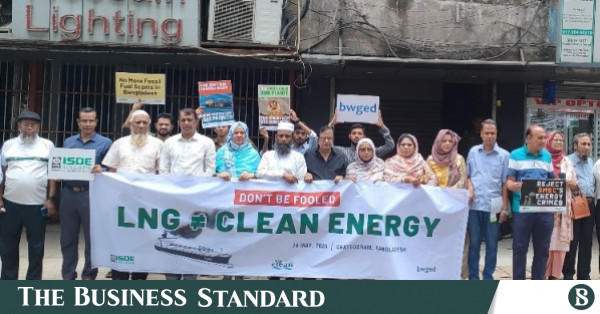ISDE Bangladesh, Coastal Livelihood and Environmental Action Network (CLEAN), and Bangladesh Working Group on Ecology and Development (BWGED) jointly organise a protest and campaign event in Chattogram on 28 May 2025. Photo: Courtesy
“>

ISDE Bangladesh, Coastal Livelihood and Environmental Action Network (CLEAN), and Bangladesh Working Group on Ecology and Development (BWGED) jointly organise a protest and campaign event in Chattogram on 28 May 2025. Photo: Courtesy
Japanese megabank Sumitomo Mitsui Banking Corporation (SMBC)’s extensive fossil fuel investments in Bangladesh are draining public funds and exacerbating the climate crisis, environmental and civil society organisations have claimed.
At a protest and campaign event held today (28 May) in Chattogram, organised by ISDE Bangladesh, Coastal Livelihood and Environmental Action Network (CLEAN), and Bangladesh Working Group on Ecology and Development (BWGED), speakers condemned SMBC’s role in supporting fossil fuel infrastructure while ignoring renewable energy solutions, reads a press release.
The event highlighted a new report by CLEAN titled “SMBC in Bangladesh: Financing Dirty Energy, Scrapping Our Future”. According to the report, SMBC has invested approximately $238.71 million in fossil fuel-based projects across Bangladesh. These include coal, LNG, and heavy fuel oil (HFO) power plants totaling a capacity of 2,218 megawatts and a 500 Mmcfd LNG terminal — yet no investment has been made in renewable energy initiatives.
Hasan Mehedi, member secretary of BWGED, warned that SMBC’s investments are creating long-term financial liabilities for Bangladesh.
“These projects have led to costly capacity payments and stranded assets. In just six years, two SMBC-financed projects — the Summit LNG Terminal and the Gazipur II Power Plant — have cost the government Tk6,355 crore [$654 million],” Mehedi said.
He further noted that if these contracts continue, total losses could reach Tk20,129 crore ($1.86 billion) by the end of the 15-year term — without delivering reliable or sustainable energy.
SM Nazer Hossain, central vice president of the Consumers Association of Bangladesh (CAB) and Executive Director of ISDE Bangladesh, called for immediate action.
“SMBC’s ongoing support for fossil fuel infrastructure not only worsens climate change but also imposes a severe burden on Bangladesh’s public finances. It’s time they shift toward clean energy investments to ensure energy justice and protect the environment,” he said.
Speakers also criticised SMBC’s lack of physical presence in Bangladesh while maintaining influence through project financing. They cited the bank’s role as financial adviser for the high-cost Matarbari Coal Power Plant and its financing of the Summit LNG Terminal, Gazipur II HFO Power Plant, and Meghnaghat LNG Power Plant — projects that are reportedly underperforming and contributing significantly to greenhouse gas emissions.
Labeling SMBC among the global “Dirty Dozen” fossil fuel financiers, civil society leaders demanded that the bank stop financing fossil fuel projects, pay reparations to affected communities, rejoin the Net-Zero Banking Alliance, and redirect its resources toward renewable energy development in Bangladesh.


